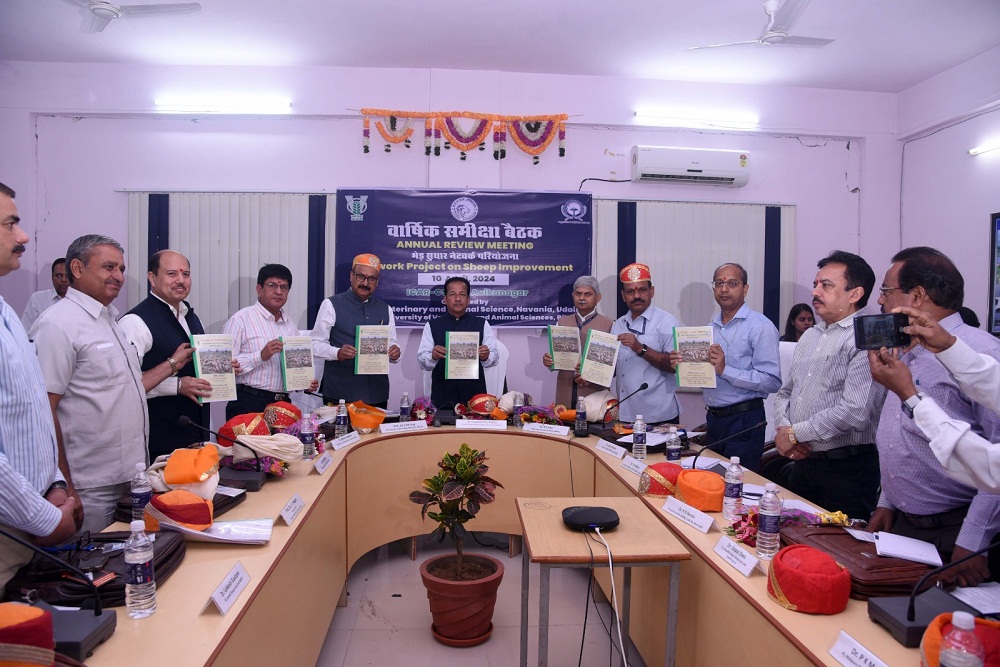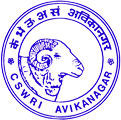BackAnnual Review Meeting of Network Project on Sheep Improvement (NWPSI) at CVAS, Navania, Udaipur
The Annual Review Meeting of ICAR-Network Project on Sheep Improvement (NWPSI) including the merged components of ICAR-Mega Sheep Seed Project (MSSP) was held on 10th April, 2024 at College of Veterinary and Animal Sciences (CVAS), Navania, Vallabhnagar, Udaipur under the Chairmanship of Dr. Raghavendra Bhatta, Deputy Director General (Animal Science), ICAR, New Delhi. It was co-chaired by Dr. G. K. Gaur, Assistant Director General (Animal Production and Breeding), Dr. Arun Kumar Tomar, Director, ICAR-CSWRI, Avikanagar. Other dignitaries present in the meeting were Dr. S.K. Garg, Vice-chancellor, RAJUVAS, Dr. Hemant Dadhich, Director Research, RAJUVAS, Dr. M.K. Chatli, Director, ICAR-CIRG, Makhdoom, Dr. H.K. Narula, Principal Scientist (AG&B), ICAR Headquarter and Dr. R.K. Nagda, Dean, CVAS. The meeting was also attended by Dr. S.S. Misra, Nodal officer/Incharge NWPSI and PI/Co-PIs of 10 cooperating units of NWPSI as well as other staff of CVAS, Navania.
The major objective of the project is genetic improvement of indigenous sheep breeds through selection and propagation of superior germplasm in the farmers’ flocks located in the breeding tracts of respective sheep breeds. The meeting reviewed the progress of different sheep units for the period of 2020 to 2023, recommended important measures for improvement in overall performance of the units and discussed future plans for implementation.
Dr. Nagda and Dr. Dadhich, on behalf of the organizers, welcomed all the dignitaries and participants to CVAS, Navania. Dr. Tomar outlined the different aspects of sheep sector and highlighted the emerging issues being faced by it. He also explained on the role of this project under changing scenario. Dr. Gaur talked in details on the genesis, evolution and achievements of AICRP/NWPSI. The inconsistent results of earlier crossbreeding research has led to change in the focus from crossbreds to indigenous sheep breeds. He emphasized on the challenge of productivity enhancement of indigenous sheep through exploitation of their genetic potential in view of the widening gap between demand and production. He stressed that the Principal Investigator mandatorily be from the core discipline of Animal Genetics & Breeding for proper implementation of the technical programme of the project. He asked all the PIs to find out the possible reasons for not achieving the desired performance in any trait and resolve them through appropriate measures. Dr. Chatli highlighted the contribution of small ruminants in the national economy and importance of adoption of scientific rearing practices by the farmers. Dr. Garg emphasized on the need to promote indigenous sheep genetic resources as meat animal for increasing popularity of mutton all over the country. Dr. Bhatta reinforced that the main purpose of the meeting is to critically evaluate the achievements of the centres in view of the given targets. He emphasized that the targets should not be soft and they need to be regularly revised to a higher level. He advocated the introduction of performance based grading of the centres and awarding the best centre with a certificate during the review meeting. He reminded that all the programmes are upto the current SFC period of 2026 only and critical evaluation of each and every programme will be done to continue them further. He stressed that the PI must be from Animal Genetics & Breeding and Co-PIs from other supportive disciplines like Animal Nutrition, LPM, Medicine etc. He took strong exception to the frequent change of PIs by some units. Taking the example of genetic improvement programme of Gir cattle in Brazil, he underscored the importance of realizing the full genetic potential of our indigenous breeds through required technological interventions. He emphasized that mutton should be given priority in sheep production due to its high demand, particularly in southern states, as well as for declining prices of wool. He outlined the importance of developing specific modules for intensive rearing of some sheep breeds. He advised the PIs to publish their research outputs in the prominent journals.
Dr. Misra presented the Project Coordinator’s Annual Report of NWPSI including the merged units of MSSP, Action Taken Report (ATR) on the recommendations of last review meeting and critical evaluation report of each unit. He also presented the revised technical programme of NWPSI with inclusion of newly proposed centres under SFC 2021-26. The progress reports of the ten cooperating units, viz. Muzaffarnagari, Marwari, Deccani, Nellore, Magra, Madras Red, Malpura, Sonadi, Mandya and Mecheri were presented by their respective PIs and discussed in the house. The meeting suggested necessary recommendations to further improve the performance of different units. It ended with vote of thanks.




